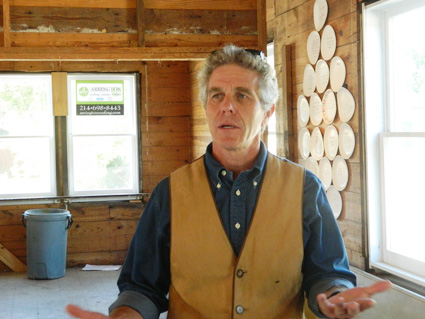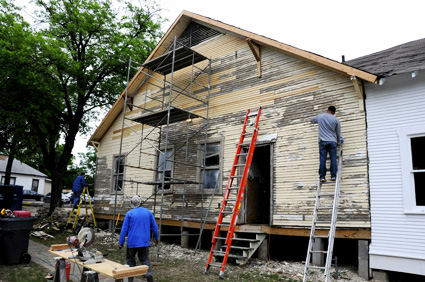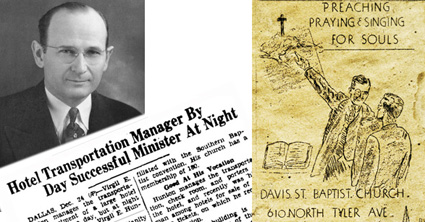By Ken Camp
A funny thing happened after real estate developer David Spence bought an abandoned Dallas church building, intending to demolish it and create a parking lot to serve nearby storefront property he was renovating.
“I fell in love with the building,” said Spence, the Good Space founder who grew up attending First Baptist Church in Waco, Texas.
While builders were salvaging floorboards from a former Sunday school classroom, they discovered a sheaf of papers, including fliers from 1941 inviting Oak Cliff residents to attend a revival meeting at Davis Street Baptist Church led by Pastor Virgil E. Hunton.
Curious about the church’s history, Spence searched the Internet and found a 1936 newspaper article about Hunton. He learned that the minister had worked days as transportation manager at the Alolphus Hotel in downtown Dallas. He also learned that Hunton built the church — meaning both the congregation and the structure in which it met — himself.

Spence tracked down Hunton’s sole surviving son, B.J., age 90, in Mesquite, Texas. He described how his father started a church at a storefront in the Cement City community in what is now the Chalk Hill area of West Dallas. In time, that congregation purchased property near the intersection of Davis and North Tyler in the Oak Cliff neighborhood.
Hunton, his sons and other volunteers labored at the property after work each day as long as daylight permitted, digging holes for foundation piers and erecting the building. Once he and his helpers completed the structure, Hunton set out to build up its membership, B.J. Hunton said.
“He said that whenever his dad saw a moving van coming into Oak Cliff, he would follow it and invite the family to church,” Spence said.
Hunton, who died in 1972, went on to build three churches in New Mexico. Davis Street Baptist Church continued to grow and eventually relocated to the south, becoming Bishop Avenue Baptist Church. Several other congregations — Tyler Street Baptist Church, Tyler Heights Baptist Church and Iglesia del Señor — later occupied the structure at Davis and Tyler.

So, instead of leveling the church building, Spence looked for creative ways to honor the congregation that worshipped there, the pastor who founded the church and the spiritual heritage of the surrounding community.
He enlisted Brent McDougal, pastor at Cliff Temple Baptist Church in Dallas, to lead a brief “decommissioning” service for the building.
“We offered a word of thanks for all the good that had been done there, and we prayed it will continue to be used for kingdom work, even if it no longer will be a church,” McDougal said.
Although the building no longer provides a practical meeting place for a congregation, Spence recognized the building could be renovated and leased to a restaurant, offering community residents a place to gather and enjoy life together.
“I just can’t bear the idea of somebody putting a bar in here,” he said, joking that he feared for his eternal destiny if he allowed it.
When boutiques and galleries that surround the property scheduled a street festival in mid-October, Spence put together an exhibit linking the church building’s past and future — Sacred Plates.

He distributed paper plates at a variety of gathering places in Oak Cliff and invited people to write a Scripture verse, song lyrics, quotation or “favorite soulful words” on the plates.
Spence solicited involvement from three Oak Cliff churches — Cliff Temple Baptist; Kessler Park United Methodist, where he is a member; and a nondenominational congregation. He also sought submissions from students at Dallas Baptist University and patrons of local businesses, including a pie shop, a bookstore, an art gallery and a yoga studio.
He arranged more than 300 plates into displays in the church building’s stripped-down sanctuary, combining it with effective lighting and accompanied by a soundtrack that includes music ranging from Southern Gospel songs to Gregorian chant, soul music and to selections from Handel’s Messiah.
“The result is a lovely spiritual snapshot of the community,” Spence said. Reflecting on the seasonal TV classic, It’s the Great Pumpkin, Charlie Brown, he added, “Oak Cliff is a sincere pumpkin patch.”
He is opening the church building from 7 p.m. to 10 p.m. every Monday until Thanksgiving, allowing local residents to view the display and add a plate with their own message.
Spence won’t require any prospective restaurateur who leases the building to maintain the Sacred Plates exhibit, but he hopes the proprietor at least will maintain the small tribute section he created to honor the church’s founding pastor.
Ideally, Spence would love to see a family-style home-cooking restaurant or soul-food restaurant inhabit the space.
“Wouldn’t it be a great place for a gospel brunch?” he asked.
